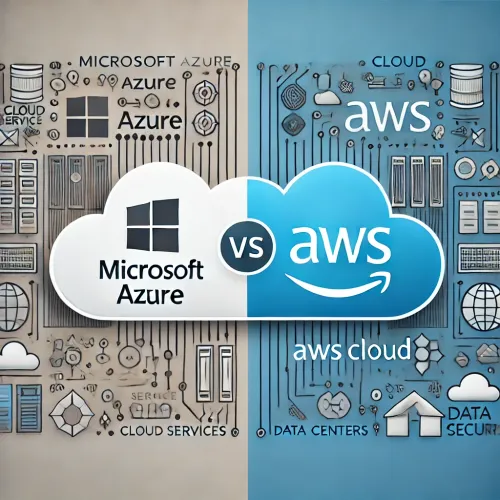
Knowledge base
August 12, 2024
Microsoft Azure vs. AWS Cloud: Which Cloud Solution Fits Your Business?
Choosing between Microsoft Azure and Amazon Web Services (AWS) is a crucial decision for any business looking to make the move to the cloud.
Both platforms offer robust and versatile solutions, but they differ in several ways that may affect your choice.
In this blog, we dive deep into the differences between Azure and AWS to help you make an informed decision.
???? Global Presence and Scalability
- Microsoft Azure:
- Data centers: More than 60 regions worldwide, giving it one of the most extensive cloud networks.
- Scalability: Azure offers excellent ability to scale quickly, especially in hybrid environments where you want to combine on-premises and cloud infrastructure.
- AWS:
- Data centers: AWS also has a global network with more than 30 regions and more than 90 availability zones.
- Scalability: AWS is known for pioneering cloud computing and offers unparalleled scalability, ideal for companies looking to grow rapidly.
????️ Services and Tools
- Microsoft Azure:
- Integration: Azure offers seamless integration with Microsoft products such as Office 365, Dynamics 365, and Active Directory, making it an attractive choice for organizations already using Microsoft solutions.
- AI and Machine Learning: Azure is investing heavily in AI, with tools such as Azure Machine Learning and Cognitive Services easily integrated into existing workflows.
- AWS:
- Wide range of services: AWS offers more than 200 services, ranging from computing, storage, and databases to machine learning and artificial intelligence.
- Open source support: AWS supports a wide range of open source technologies, making it a flexible choice for developers and companies looking to innovate.
???? Pricing Models and Cost Management
- Microsoft Azure:
- Pricing structure: Azure offers a pay-as-you-go model with various discounts for companies that commit to longer-term contracts.
- Cost Management: Azure Cost Management lets you monitor and optimize your expenses, which is useful for staying within budgets.
- AWS:
- Pricing structure: AWS also has a pay-as-you-go model, but also offers reserved instances and savings plans that can provide significant cost savings.
- Cost management: AWS offers detailed billing and cost tools such as AWS Cost Explorer and AWS Budgets, which allow you to understand and better manage your expenses.
???? Security and Compliance
- Microsoft Azure:
- Security features: Azure offers comprehensive security options such as multi-factor authentication, compliance certifications and advanced threat protection.
- Compliance: Azure meets more than 90 compliance certifications, including GDPR, ISO/IEC 27001, and HIPAA, making it a safe choice for regulated industries.
- AWS:
- Security features: AWS offers a high level of security with encryption, identity and access management (IAM), and a wide range of compliance certifications.
- Compliance: AWS meets a similar number of compliance requirements, making it suitable for companies in regulated industries as well.
???? Market position and Innovation
- Microsoft Azure:
- Market position: Azure is growing rapidly and increasing in market share, especially in the enterprise sector due to its strong integration with Microsoft products.
- Innovation: Microsoft continues to invest in new technologies such as quantum computing and AI, making Azure a future-proof choice.
- AWS:
- Market position: AWS remains the world’s largest cloud provider, with an established reputation and a broad ecosystem of partners and developers.
- Innovation: AWS is known for its continuous innovation, regularly adding new services and features to stay at the forefront of the market.
???? Conclusion: Which Cloud is Right for You?
The choice between Microsoft Azure and AWS depends on the specific needs of your organization.
- Choose Azure if your organization already relies heavily on Microsoft technologies and you want seamless integration with existing systems.
- Go for AWS if you are looking for a wide range of services, flexibility and the first choice of many companies worldwide.
Both platforms offer powerful tools and technologies to support your digital transformation.
It’s worth considering both options and determining which one best suits your company’s goals.
???? Take the time to make an informed decision, and continue your cloud journey with confidence!
Want to know more?

Related blogs
Tech Updates: Microsoft 365, Azure, Cybersecurity & AI – Wekelijks in je Mailbox.



